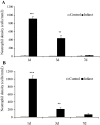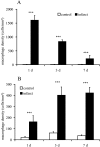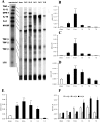Of mice and dogs: species-specific differences in the inflammatory response following myocardial infarction
- PMID: 14742270
- PMCID: PMC1602262
- DOI: 10.1016/S0002-9440(10)63154-9
Of mice and dogs: species-specific differences in the inflammatory response following myocardial infarction
Abstract
Large animal models have provided much of the descriptive data regarding the cellular and molecular events in myocardial infarction and repair. The availability of genetically altered mice may provide a valuable tool for specific cellular and molecular dissection of these processes. In this report we compare closed chest models of canine and mouse infarction/reperfusion qualitatively and quantitatively for temporal, cellular, and spatial differences. Much like the canine model, reperfused mouse hearts are associated with marked induction of endothelial adhesion molecules, cytokines, and chemokines. Reperfused mouse infarcts show accelerated replacement of cardiomyocytes by granulation tissue leading to a thin mature scar at 14 days, when the canine infarction is still cellular and evolving. Infarcted mouse hearts demonstrate a robust but transient postreperfusion inflammatory reaction, associated with a rapid up-regulation of interleukin-10 and transforming growth factor-beta. Unlike canine infarcts, infarcted mouse hearts show only transient macrophage infiltration and no significant mast cell accumulation. In correlation, the growth factor for macrophages, M-CSF, shows modest and transient up-regulation in the early days of reperfusion; and the obligate growth factor for mast cells, stem cell factor, SCF, is not induced. In summary, the postinfarction inflammatory response and resultant repair in the mouse heart shares many common characteristics with large mammalian species, but has distinct temporal and qualitative features. These important species-specific differences should be considered when interpreting findings derived from studies using genetically altered mice.
Figures











References
-
- Jugdutt BI, Hutchins GM, Bulkley BH, Becker LC. Myocardial infarction in the conscious dog: three-dimensional mapping of infarct, collateral flow and region at risk. Circulation. 1979;60:1141–1150. - PubMed
-
- Michael LH, Lewis RM, Brandon TA, Entman ML. Cardiac lymph flow in conscious dogs. Am J Physiol. 1979;237:H311–317. - PubMed
-
- James JF, Hewett TE, Robbins J. Cardiac physiology in transgenic mice. Circ Res. 1998;82:407–415. - PubMed
-
- Franz WM, Mueller OJ, Hartong R, Frey N, Katus HA. Transgenic animal models: new avenues in cardiovascular physiology. J Mol Med. 1997;75:115–129. - PubMed
Publication types
MeSH terms
Substances
Grants and funding
LinkOut - more resources
Full Text Sources
Other Literature Sources
Medical
Research Materials

